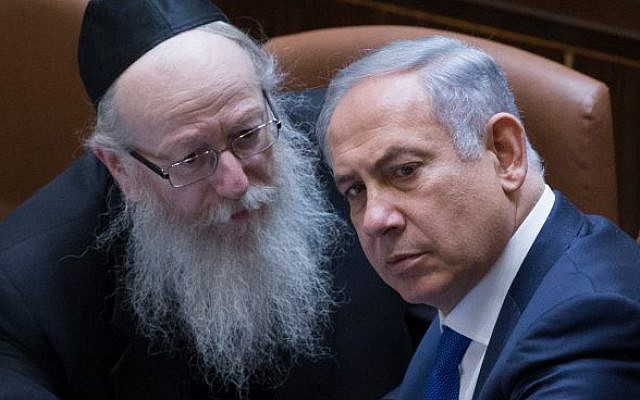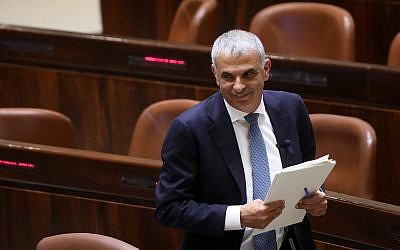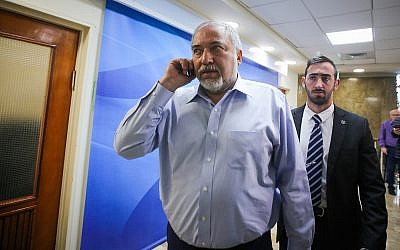PM holds last-ditch talks with party leaders, as fight over ultra-Orthodox conscription threatens to topple government

Prime Minister Benjamin Netanyahu and leaders of his coalition’s ultra-Orthodox parties reportedly reached an understanding late Sunday, in last-ditch talks aimed at defusing a crisis that earlier in the day seemed all but certain to lead to early elections.
Two key figures in the crisis, United Torah Judaism (UTJ) head Yaakov Litzman and Yisrael Beytenu chief Avigdor Liberman, met with Netanyahu at the Prime Minister’s Office, followed by Kulanu head Moshe Kahlon. The round of meetings seemed to mark a shift from earlier in the day, when the coalition party leaders were entrenched in their positions and refusing to compromise.
The ultra-Orthodox coalition parties threatened last week to vote down the 2019 state budget unless legislation is approved this week, exempting members of their communities from the military draft, while Kahlon, the finance minister, has threatened to quit his post and the coalition if the budget is not passed this week.
After Sunday night’s meeting, sources in Likud were quoted by multiple reports as saying that Netanyahu had agreed to push the draft bill through the Ministerial Committee for Legislation and bring it to a preliminary plenum vote before the budget is passed. The bill would then be shelved until the Knesset’s summer session.
The Council of Torah Sages, a panel of rabbis that holds sway over several members of UTJ, approved the understanding with Netanyahu, reports said. But the deal still requires the assent of Kahlon, as well as that of Liberman, who has insisted throughout the crisis that he would not support any version of the conscription bill that is not drafted by his own ministry and the IDF.
The game of brinkmanship has sparked the most severe coalition crisis yet for the three-year-old Netanyahu government, and at times on Sunday, snap elections as early as June seemed all but assured.

The crisis persisted despite an overnight summit between Netanyahu and ultra-Orthodox lawmakers, in which Netanyahu presented his conditions for ending the standoff: full agreement from the ultra-Orthodox on a compromise version of a new draft bill, a commitment from Liberman to let the bill pass in parliament, and a commitment from Kahlon to vote in favor.
Netanyahu has effectively told his coalition partners that he is willing to go to elections, and would only work to prevent the government’s collapse if he received up-front assurances that the other parties in the government did not plan to topple it down the road. The prime minister is beset by several corruption allegations, and his coalition partners have hinted that they would likely dismantle the government should he be indicted.

Earlier Sunday, Jewish Home head Naftali Bennett, the education minister, said he would rethink support for the prime minister if early elections were called over his legal woes.
For his part, Netanyahu insisted throughout Sunday that he wished to avoid early elections. “We are working toward a stable government that will continue until the end of its term in November 2019,” he told his Knesset faction.
“In order for that to happen,” the prime minister said, “all of the factions must come to an agreement and decide to continue together. We are working to try and achieve this because Israeli citizens want a stable government that will last its intended time.”
The ultra-Orthodox Shas party leader Aryeh Deri, the interior minister, said Sunday that given the opposition within the coalition to the conscription bill, Netanyahu’s conditions prove that he wants elections and that negotiations are a waste of time, Army Radio reported.
Kahlon, meanwhile, made clear his Kulanu party’s willingness to go to early polls. The defection of its 10 MKs would mean the end of the coalition. Asked on his way to the cabinet meeting Sunday morning about the possibility of the government dissolving due to the crisis, he said: “We are ready for elections. Of course.”
As reported by The Times of Israel
